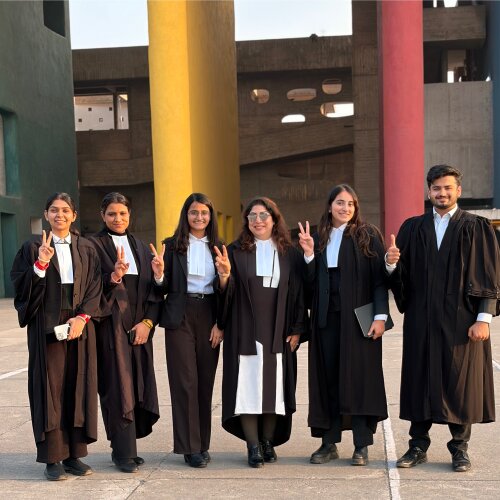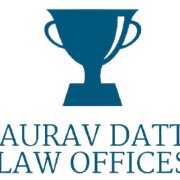Best Housing, Construction & Development Lawyers in Chandigarh
Share your needs with us, get contacted by law firms.
Free. Takes 2 min.
Free Guide to Hiring a Real Estate Lawyer
List of the best lawyers in Chandigarh, India
About Housing, Construction & Development Law in Chandigarh, India
Chandigarh, known as 'The City Beautiful', is a well-planned city in India with a distinct architectural and cultural history. The housing, construction, and development (HCD) sector in Chandigarh is regulated by a combination of national and local laws that aim to control urban development and ensure planned growth. The local administration and the Chandigarh Housing Board play a pivotal role in policy formulation and implementation. Lawyers in this field often navigate a complex matrix of property rights, development regulations, and municipal laws to assist clients.
Why You May Need a Lawyer
There are several situations where a lawyer specializing in housing, construction, and development law might be necessary in Chandigarh. These include property disputes, issues with property titles, compliance with Chandigarh Master Plan regulations, navigating building approvals, handling tenancy and rental disputes, dealing with land acquisition and compensation issues, and resolving conflicts related to construction contracts. Additionally, lawyers can provide guidance on regulatory compliance for residential or commercial projects.
Local Laws Overview
Chandigarh's development laws are a mix of central laws like the Real Estate (Regulation & Development) Act, 2016 (RERA), and local regulations under the Punjab New Capital (Periphery) Control Act, 1952, and the Chandigarh Periphery Control Rules, 1952. The Chandigarh Building Bye-laws, 2017, outline detailed provisions for construction approvals and building standards. The local administration also enforces environmental regulations and heritage conservation policies that may impact developments. Working with legal experts can help navigate these statutory requirements effectively.
Frequently Asked Questions
What are the primary laws governing housing and construction in Chandigarh?
Key laws include RERA, The Chandigarh Building Bye-laws, 2017, and The Punjab New Capital (Periphery) Control Act, 1952. These laws, along with national regulations, dictate the legal framework for housing and construction here.
How does RERA affect my housing project in Chandigarh?
RERA mandates that developers register their projects and adhere to specified quality and delivery standards. It provides a mechanism for buyers to address grievances and ensures transparency in the transactions.
What is the role of Chandigarh Housing Board?
The Chandigarh Housing Board is responsible for providing affordable housing and managing urban development projects. They also allocate lands and enforce compliance with housing policies.
Are there any specific restrictions for construction in Chandigarh's heritage areas?
Yes, Chandigarh's heritage status imposes strict guidelines on constructions, especially within the Capitol Complex area, to preserve its architectural integrity. Legal advice is often essential to understand these restrictions.
Can I convert my residential property to a commercial one?
Conversion of residential properties to commercial usage is subject to regulatory approvals and zoning laws. Usually, such conversions require permissions from the local authorities.
What should I do if I have a dispute over property boundaries?
Engaging a lawyer to help mediate or litigate the dispute can be crucial. Legal guidance can assist in resolving the issue through negotiation or in courts if necessary.
Is environmental clearance necessary for all construction projects?
Major development projects require environmental clearance from the State Environmental Impact Assessment Authority to ensure compliance with environmental standards and mitigate potential impacts.
How can I check the legitimacy of a property title in Chandigarh?
Property titles can be verified with the Office of the Sub-Registrar or through legal assistance to ensure clear titles and prevent future disputes.
What is the process for obtaining building plan approval?
Applicants must submit their building plans to the Estate Office, Chandigarh Administration, and after fulfilling the outlined conditions and regulations, approvals are granted.
What are my rights as a tenant in Chandigarh?
Tenants in Chandigarh have rights under the Rent Control Act, which governs tenant-landlord relationships, rental agreements, eviction conditions, and rent regulation.
Additional Resources
For legal assistance, refer to the Chandigarh Bar Association for certified lawyers. The Estate Office, Chandigarh Administration, offers guidance on property-related queries. The Real Estate Regulatory Authority (RERA) Punjab's website provides resources on real estate regulations. Additionally, the Chandigarh Housing Board is a practical resource for housing policies and development updates.
Next Steps
If you need legal assistance in housing, construction, or development, begin by consulting a qualified lawyer with expertise in Chandigarh's local laws. Prepare all relevant documents and details before meeting with your lawyer to ensure a productive consultation. Verify your lawyer's credentials with the Chandigarh Bar Association. Finally, keep abreast of local regulations and policy changes that could affect your rights or responsibilities in the field of housing and development.
Lawzana helps you find the best lawyers and law firms in Chandigarh through a curated and pre-screened list of qualified legal professionals. Our platform offers rankings and detailed profiles of attorneys and law firms, allowing you to compare based on practice areas, including Housing, Construction & Development, experience, and client feedback.
Each profile includes a description of the firm's areas of practice, client reviews, team members and partners, year of establishment, spoken languages, office locations, contact information, social media presence, and any published articles or resources. Most firms on our platform speak English and are experienced in both local and international legal matters.
Get a quote from top-rated law firms in Chandigarh, India — quickly, securely, and without unnecessary hassle.
Disclaimer:
The information provided on this page is for general informational purposes only and does not constitute legal advice. While we strive to ensure the accuracy and relevance of the content, legal information may change over time, and interpretations of the law can vary. You should always consult with a qualified legal professional for advice specific to your situation.
We disclaim all liability for actions taken or not taken based on the content of this page. If you believe any information is incorrect or outdated, please contact us, and we will review and update it where appropriate.












